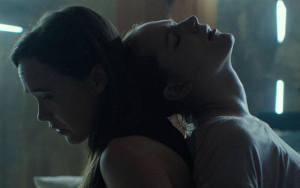Metro: Into the Forest linked Elliot Page and Patricia Rozema
 By Richard Crouse – Metro Canada
By Richard Crouse – Metro Canada
“We hadn’t met before at all,” says Elliot Page of his Into the Forest director Patricia Rozema, “and you would think we would have.”
A big screen treatment of one of Robert Munsch’s children’s books brought them together.
“I was in L.A. and checked in to go back to Toronto,” says Rozema.
“Someone said, ‘Are you available to meet with Ellen Page about Paper Bag Princess?’ because we were both circling around it. I said OK and unchecked in and we met and sat in a café.”
“We just really connected,” says Page. “It was so immediate. Then I sent her (Jean Hegland’s novel) Into the Forest.”
The Paper Bag Princess is still on the back burner, but the director says once she got to know Page she wanted to work with her as an actor and producer on Into the Forest because, “I felt she had integrity.”
“After you have done a few (movies) you start thinking, I only want to work with people I want to have dinner with. Seriously. I really look much more closely at who I am working with now.”
There are no hoards of marauding zombies or planet eating black holes, massive solar eruptions or robots involved in their new end-of-the-world drama.
Instead it’s an anti-Michael Bay apocalypse film; a dystopian story focusing attention on the aftermath of disaster and the ties that bind one family together.
“It seemed to have so many things,” says Rozema on why she was drawn to the project.
“It had urgency. It had poetry. It had political import. It seemed to be intimate. It seemed to be really emotional. It seemed like it would be a visual feast and have action and suspense. I thought, ‘What doesn’t this have?’ And it was doable for not that much money because it was basically two girls in the forest.”
The “two girls in the forest” are Page and Evan Rachel Wood. They play sisters living with their widower father deep in the Pacific Northwest forest. It’s an isolated, quiet life, made quieter when a massive blackout knocks out their power. As the days turn into weeks it becomes clear the power may never come back. The closest grocery store has run out of food and the hand-cranked radio suggests terrorism is responsible for the outage.
Violence is in the air, and when tragedy strikes the sisters are forced to become self-sufficient while living off-the-grid.
“I have always loved post apocalyptic stories, films and survivalist stuff,” says Page, “and this really encompassed a lot of stuff I was thinking about at the time in terms of my relationship to the environment and society. What does that mean? What does our future look like?
“To be able to tell that story through the relationship (of the sisters), who are so powerful and so resilient, attracted me.”
Rozema, who also wrote the film’s screenplay, says the approach to the dystopian story isn’t the only unique thing about the movie. She points out that two female leads in a film is “a rare event.”
“It’s ridiculous how rare that is,” she says. “I said that to a friend of mine who is so progressive. He said, ‘Aren’t there many?’ What planet are you on? I said, ‘Name one.’ He said, Thelma and Louise. I said, ‘Name another one.’ That was it.”
